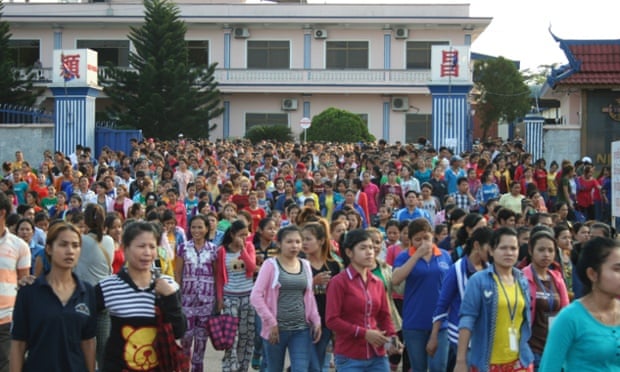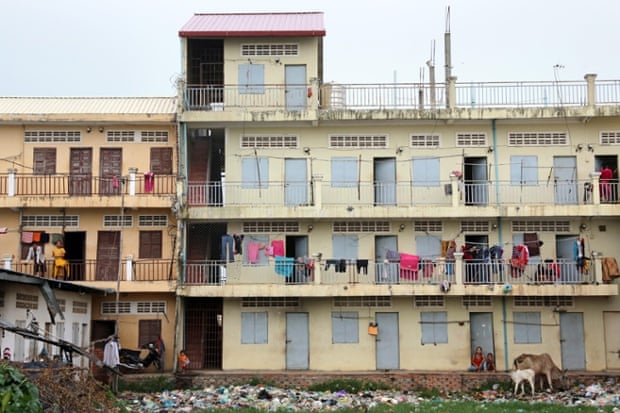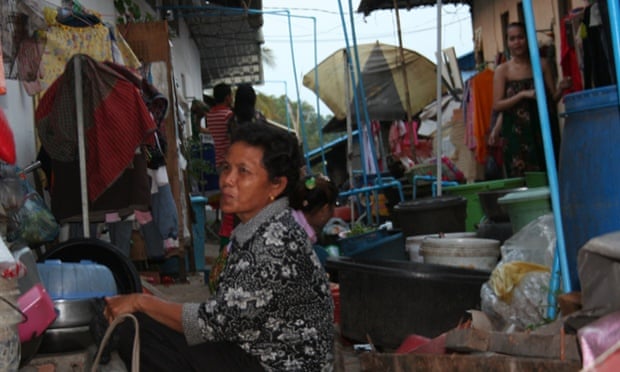 |
| Workers outside New Star factory in Sihanoukville, Cambodia. Photograph: Jamie Elliott |
Jamie Elliott in Phnom Penh
Monday 30 March 2015 Guardian
Like most teenagers, Jorani, who says she is 14, has plenty of stamina. She has just spent the day making hundreds of shoes at the New Star Shoes Co factory in Sihanoukville, Cambodia.
“I punch holes in about 300 shoes every day, and work eight hours a day, six days a week,” she says, in a barely audible voice. “But I don’t get too tired.”
Jorani lives with her sister in one of the dark, cramped rooms in an accommodation block opposite the factory. “I have come to work in the shoe factory because my family is poor,” she says, as she washes dishes on the ground in a tiny alley, where women have to bathe due to the lack of private washing facilities. “If I had a choice, I would like to have time to study and go to school.”
Taiwanese-owned New Star makes shoes for brands including Geox, an Italian firm with 1,225 stores worldwide and sales of $873m (£586m) last year. Until January, sports shoe company Asics was also a New Star customer.
 |
| Textile workers’ accommodation in the industrial area of Pochentong in Phnom Penh. Photograph: Friedrich Stark/Alamy |
Jorani, like many underage workers, lied about her age to get her job. “The factory doesn’t know I’m 14,” she says. The legal minimum age to work in a factory in Cambodia is 15. But the law says “juveniles”, those aged 15 to 17, must not work overtime or do heavy work. So, like many factories, New Star – which employs about 4,000 workers, most of them female – sets its age limit at 18.
Some factories try to hide underage workers when visitors come, according to aHuman Rights Watch report into the Cambodian garment industry published this month.
"They told me to hide under the table and put a pile of clothes on us. We kept very quiet when the visitors were there."
15-year-old clothing factory worker
One 15-year-old, who started work in a clothes factory aged 14, told HRW researchers: “They told me to hide under the table and put a pile of clothes on us. We tried to keep very quiet when the visitors were there.”
A 17-year-old at a different factory told HRW that early last year, a day before visitors were due, management called a meeting of all young workers and told them to stay at home the next day.
One of the main problems is the ease with which workers can get fake IDs. “My daughter was too young to work, so we borrowed a family book and birth certificate from another family,” says Tha, the father of a 17-year-old New Star worker. “Families help one another.” As there are no photos on Cambodian IDs, his daughter simply memorised the new details. Tha used the same procedure for his niece, who was 16 when she started work at the factory.
Poverty often leaves parents with few choices, according to Oxfam’s country director for Cambodia, Chris Eijkemans. “If they help their children lie about their age to get a job, it is usually because they have no other way of providing the basic necessities of food and shelter for their family,” he says.
Accommodations of the textile workers in the industrial area Pochentong in Phnom Penh, Cambodia
Weak safeguarding of children is another problem. “For many children in Cambodia, the child protection situation is dire,” says Unicef’s chief of communication, Denise Shepherd-Johnson. “Strengthening the child- and social-protection systems is a priority.”
At 5pm, thousands of young women, and a few hundred young men, stream out of the New Star gates.
“There is almost no one aged over 25 at this factory,” says Ath Thorn, head of the Coalition of Cambodian Apparel Workers’ Democratic Union (C Cawdu), Cambodia’s largest garment workers’ trade union.
Nearly all the workers we speak to at roadside cafes that serve New Star say they are aged between 16 and 18. “I’m not happy working here, but I have no choice,” says one young woman, who seven months ago used fake ID to get a job when she was 16.
The companies are taking the best years of these young women's lives and working them to exhaustion
Dave Welsh, labour rights group Solidarity Center
Her prospects are not good, according to Dave Welsh, country director for US-based labour rights group the Solidarity Centre. “At the end of their career, at the ripe old age of 35, the majority [of workers] are left with no savings, no transferable skills, and very little education,” he says. “The companies are taking the best years of these young women’s lives and working them to exhaustion.”
Tha’s daughter, Neary, bears this out. “Sometimes I get tired and get swollen hands because we have to pull the soles of the shoes very hard, which makes my wrists and hands hurt,” she says.
Factories and brands know all about the role of fake IDs in age-rule breaches, says Welsh. “Any major brand which says they are unaware of the connection between the fake ID problem and the underage worker problem is either being untruthful or admitting that they cannot monitor an industry where a given brand is only invested in 20 or 30 factories.”
Moeun Tola, head of legal advice atCambodia’s Community Legal Education Centre, makes the same point. “Because the manufacturers don’t want to abide by the rules for juvenile workers, they accept falsified documents and pretend not to know that workers are under 18.”
A spokesperson for New Star Corporation, the parent company of New Star Shoes Co, says that the company makes every effort to ensure that workers are not under 18, interviewing all applicants in person. If suspicions are raised the company asks for additional proof of age, such as a birth certificate with the stamp of the village elder.
A senior manager at New Star Corporation, Living Lu, blames the Cambodian authorities for the fake ID problem. “Because of the weak control of fake certificates by the Cambodian government, some workers can get fake certificates easily,” he says.
Geox says it has no evidence of underage workers at New Star, which signed its code of conduct and manufacturing agreement, binding suppliers to respect local legal requirements for age of employment and the International Labour Organisation (ILO) convention 138 – it publishes its code of ethics on its website. Any worker aged below 18 should be clearly identified, the company adds. On 31 October and 1 November 2014, Geox says, it audited New Star, based on site observations, interviews with employees, questionnaire data and examination of the company’s records. The audit did not identify any underage workers according to Cambodian laws on juvenile work protection.
An Asics spokesperson says the company has sponsored child labour prevention training for all its Cambodian factories (including New Star).
At Keeptop garment factory, which employs about 250 people in the Cambodian countryside, we meet 16- and 17-year-olds working extremely long hours. “Because there is a rush on, they are making us work [from 7.30am] until 10.30pm, Monday to Friday,” one young woman says. “If we don’t do the overtime that we are asked to do two or three times, the factory will sack us.”
Despite the ban on overtime for 15- to 17-year-olds, there is little incentive for employers to stick to the rules. “If an employer breaks the law, they don’t get punished, so the employer will break the law again and again,” says C Cawdu union organiser Rama An.
A spokesperson for Keeptop says that they are aware that some of their workers are aged between 16 and 18. “We have put [this] on record in [the] labour department.” The spokesperson also says that staff are not pressured to work excessive extra hours, adding that all overtime takes place between 4.30pm and 6.30pm. To qualify for an export licence, garment factories must register with theInternational Labour Organisation’s Better Factories Cambodia (BFC) monitoring programme. BFC also started to work with shoe factories in 2012, but on a voluntary basis.
 |
| Workers' accommodation opposite the New Star factory. |
Brands are often vocal about working with BFC, although, until late 2013, findings from the monitor’s factory visits were available only to the factories themselves and the brands they supplied. But after a 13-year-old worker died in aceiling collapse at a Wing Star Shoes factory in 2013, BFC came under pressure to be more open, and launched its “transparency programme”.
Summary reports now show whether New Star, and 524 other BFC-registered factories, have passed or failed on 21 “critical issues” including child labour. However, details of individual failings and the identity of brands that the factories supply remain secret.
The big gap, according to BFC deputy programme manager Camilla Roman, is enforcement, which is the Cambodian government’s responsibility. Although BFC gives the government details of every child labour case it uncovers, it does not know of a single instance of enforcement action being taken.
“At the moment we don’t have any information about follow-up action by the ministry of labour,” Roman says. “We would like to have … more information about action they take when we pass on to them confirmed child labour cases.”
This may explain why last month it took only half an hour to find a New Star worker who said she was 14, exactly a year after BFC identified two other workers under 15 at the same factory.
Despite these cases, there has been no further assessment visit by BFC to New Star since February 2014. No date has been set for one, and BFC cannot say whether such a visit will happen this year.
Nonetheless, Thorn is optimistic. “I think in the future the government will implement the law, and conditions for workers will get better,” he says. “The pressure from brands will make companies improve.”
Heng Sour, spokesman for the ministry of labour, says: “The ministry of labour and vocational training always has taken the child labour as a serious issue. The ministry not only follows up cases uncovered by BFC, but also has its own random inspections to prevent… child labour.” He says that when any child labour case is uncovered, the ministry – along with the BFC, the Garment Manufacturers’ Association in Cambodia (GMAC) and the ministry of commerce – always carries out a joint inspection.
In a letter to the Cambodia Daily, Ken Loo, secretary general of GMAC, says the organisation takes a zero tolerance approach to underage workers. “The numbers of underage workers found in GMAC members’ factories is very small, and those that are found have mostly either presented fake IDs or opted to impersonate someone else, all… their own violations.”
In Sihanoukville, as she washes the last of her dishes, Jorani answers instantly when asked what she would like to do with her life. “I want to be a teacher,” she says.
Factory workers’ names have been changed

No comments:
Post a Comment